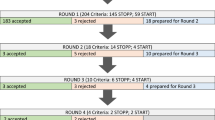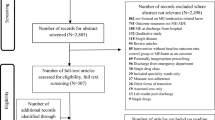Abstract
Background
Number of medicines and medicines appropriateness are often used as outcome measures to evaluate the effectiveness of deprescribing interventions.
Aim
The aim of this study was to evaluate changes in prescribing, potentially inappropriate prescriptions (PIP) and prescribing of low-value medicines in older people with multimorbidity and significant polypharmacy.
Method
This study was a retrospective secondary analysis of prescription data from a cluster randomised controlled trial involving 404 participants aged ≥ 65 years and prescribed ≥ 15 repeat medicines from 51 different general practices. For this study, repeat medications at baseline and follow-up (~ 1 year later) were assigned Anatomical Therapeutic Classification (ATC) codes. Outcomes were the most commonly prescribed and potentially inappropriately prescribed drug groups, the most frequently discontinued or initiated drug groups and the number of changes per person between baseline and follow-up.
Results
There were 7051 medicines prescribed to 404 participants at baseline. There was a median of 17 medicines (IQR 15–19) at baseline and 16 (IQR 14–19) at follow-up. PIP represented 17.1% of prescriptions at baseline and 15.7% (n = 6777) at follow-up. There were reductions in the prescription of most drug groups with the largest reduction in antiplatelet prescriptions. Considering medication discontinuations, initiations and switches, there was a median of five medication changes per person (range 0–30, IQR 3–9) by follow-up. There were 95 low-value prescriptions at baseline reducing to 78 at follow-up.
Conclusion
The number of medication changes per person was not reflected by summarising medication count at two time points, highlighting the complexity of prescribing for patients with polypharmacy. Frequent medication changes has potentially important implications for patients in terms of adherence and medication safety.
Trial registry
The SPPiRE trial was registered prospectively on the ISRCTN registry (ISRCTN12752680).



Similar content being viewed by others
References
Fortin M, Stewart M, Poitras ME, et al. A systematic review of prevalence studies on multimorbidity: toward a more uniform methodology. Ann Fam Med. 2012;10(2):142–51.
Khezrian M, McNeil CJ, Murray AD, et al. An overview of prevalence, determinants and health outcomes of polypharmacy. Therapeut Adv Drug Saf. 2020;11:2042098620933741.
Masnoon N, Shakib S, Kalisch-Ellett L, et al. What is polypharmacy? A systematic review of definitions. BMC Geriatr. 2017;17(1):230.
Spinewine A, Schmader KE, Barber N, et al. Appropriate prescribing in elderly people: How well can it be measured and optimised? Lancet. 2007;370(9582):173–84.
Wallace J, Paauw DS. Appropriate prescribing and important drug interactions in older adults. Med Clin North Am. 2015;99(2):295–310.
Guthrie B, McCowan C, Davey P, et al. High risk prescribing in primary care patients particularly vulnerable to adverse drug events: cross sectional population database analysis in Scottish general practice. BMJ. 2011;342:d3514.
Payne RA, Abel GA, Avery AJ, et al. Is polypharmacy always hazardous? A retrospective cohort analysis using linked electronic health records from primary and secondary care. Br J Clin Pharmacol. 2014;77(6):1073–82.
Scottish Government Model of Care Polypharmacy Working Group. Polypharmacy guidance. 2nd ed. NHS Scotland: Scottish Government; 2015.
American Geriatrics Society Expert Panel on the Care of Older Adults with Multimorbidity. Guiding principles for the care of older adults with multimorbidity: an approach for clinicians. J Am Geriatr Soc. 2012;60(10):E1-25.
Multimorbidity: assessment, prioritisation and management of care for people with commonly occurring multimorbidity. NICE Guideline. NICE; 2016. [Available from: https://www.nice.org.uk/guidance/ng56 Accessed 27 Sep 2022
Moriarty F, Hardy C, Bennett K, et al. Trends and interaction of polypharmacy and potentially inappropriate prescribing in primary care over 15 years in Ireland: a repeated cross-sectional study. BMJ Open. 2015;5(9):e008656.
Avery AJ, Bell BG. Rationalising medications through deprescribing. BMJ. 2019;364:l570.
Gnjidic D, Le Couteur DG, Kouladjian L, et al. Deprescribing trials: methods to reduce polypharmacy and the impact on prescribing and clinical outcomes. Clin Geriatr Med. 2012;28(2):237–53.
McCarthy C, Clyne B, Corrigan D, et al. Supporting prescribing in older people with multimorbidity and significant polypharmacy in primary care (SPPiRE): a cluster randomised controlled trial protocol and pilot. Implement Sci. 2017;12(1):99.
McCarthy C, Clyne B, Boland F, et al. GP-delivered medication review of polypharmacy, deprescribing, and patient priorities in older people with multimorbidity in Irish primary care (SPPiRE Study): a cluster randomised controlled trial. PLoS Med. 2022;19(1):e1003862.
McCarthy C, Moriarty F, Wallace E, et al. The evolution of an evidence based intervention designed to improve prescribing and reduce polypharmacy in older people with multimorbidity and significant polypharmacy in primary care (SPPiRE). J Comorbid. 2020;10:2235042X2094624. https://doi.org/10.1177/2235042X20946243.
Items which should not routinely be prescribed in primary care: Guidance for CCGs Version 2: NHS England and NHS Improvement; 2019 [Available from: https://www.england.nhs.uk/wp-content/uploads/2019/08/items-which-should-not-routinely-be-prescribed-in-primary-care-v2.1.pdf. Accessed 27 Sep 2022
Stephenson A, Seitz D, Bell CM, et al. Inhaled anticholinergic drug therapy and the risk of acute urinary retention in chronic obstructive pulmonary disease: a population-based study. Arch Intern Med. 2011;171(10):914–20.
Dreischulte T, Grant AM, McCowan C, et al. Quality and safety of medication use in primary care: consensus validation of a new set of explicit medication assessment criteria and prioritisation of topics for improvement. BMC Clin Pharmacol. 2012;12:5.
Pirmohamed M, James S, Meakin S, et al. Adverse drug reactions as cause of admission to hospital: prospective analysis of 18820 patients. BMJ. 2004;329(7456):15–9.
Howard RL, Avery AJ, Slavenburg S, et al. Which drugs cause preventable admissions to hospital? A systematic review. Br J Clin Pharmacol. 2007;63(2):136–47.
Lam KD, Miao Y, Steinman MA. Cumulative changes in the use of long-term medications: a measure of prescribing complexity. JAMA Int Med. 2013;173(16):1546–7.
von Buedingen F, Hammer MS, Meid AD, et al. Changes in prescribed medicines in older patients with multimorbidity and polypharmacy in general practice. BMC Fam Pract. 2018;19(1):131.
Radomski TR, Decker A, Khodyakov D, et al. Development of a metric to detect and decrease low-value prescribing in older adults. JAMA Network Open. 2022;5(2):e2148599.
Falster MO, Charrier R, Pearson SA, et al. Long-term trajectories of medicine use among older adults experiencing polypharmacy in Australia. Br J Clin Pharmacol. 2021;87(3):1264–74.
García Rodríguez LA, Cea Soriano L, de Abajo FJ, et al. Trends in the use of oral anticoagulants, antiplatelets and statins in four European countries: a population-based study. Eur J Clin Pharmacol. 2022;78(3):497–504.
Piepoli MF, Hoes AW, Agewall S, et al. European Guidelines on cardiovascular disease prevention in clinical practice: the sixth joint task force of the European Society of Cardiology and Other Societies on Cardiovascular Disease Prevention in Clinical Practice (constituted by representatives of 10 societies and by invited experts) developed with the special contribution of the European Association for Cardiovascular Prevention & Rehabilitation (EACPR). Eur Heart J. 2016;37(29):2315–81.
Bloom CI, Elkin SL, Quint JK. Changes in COPD inhaler prescriptions in the United Kingdom, 2000 to 2016. Int J Chron Obstruct Pulmon Dis. 2019;14:279–87.
Smith A, Barry M. Oral anticoagulants - utilisation and expenditure under the community drugs schemes. Ir Med J. 2020;113(5):71.
NMIC bulletin: prescribing in the elderly Dublin: St James's Hospital, Dublin; 2010 [Available from: http://www.stjames.ie/GPsHealthcareProfessionals/Newsletters/NMICBulletins/NMICBulletinIndexbyYear/. Accessed 27 Sep 2022.
Gray SL, Hanlon JT. Anticholinergic medication use and dementia: latest evidence and clinical implications. Ther Adv Drug Saf. 2016;7(5):217–24.
Dauphinot V, Mouchoux C, Veillard S, et al. Anticholinergic drugs and functional, cognitive impairment and behavioral disturbances in patients from a memory clinic with subjective cognitive decline or neurocognitive disorders. Alzheimers Res Ther. 2017;9(1):58.
Avery AJ, Rodgers S, Cantrill JA, et al. A pharmacist-led information technology intervention for medication errors (PINCER): a multicentre, cluster randomised, controlled trial and cost-effectiveness analysis. The Lancet. 2012;379(9823):1310–9.
Cardwell K, Smith SM, Clyne B, et al. Evaluation of the General Practice Pharmacist (GPP) intervention to optimise prescribing in Irish primary care: a non-randomised pilot study. BMJ Open. 2020;10(6):e035087.
Levinson W, Kallewaard M, Bhatia RS, et al. ‘Choosing Wisely’: a growing international campaign. BMJ Qual Saf. 2015;24(2):167–74.
Grimshaw JM, Patey AM, Kirkham KR, et al. De-implementing wisely: developing the evidence base to reduce low-value care. BMJ Qual Saf. 2020;29(5):409–17.
Barry M. Lidocaine 700 mg medicated plaster (Versatis®) Prescribing and Cost Guidance: Health Service Executive; 2021 [updated 21/04/2021. Available from: https://www.hse.ie/eng/services/publications/clinical-strategy-and-programmes/lidocaine-versatis-prescribing-cost-summary.pdf. Accessed 27 Sep 2022.
Sumukadas D, McMurdo ME, Mangoni AA, et al. Temporal trends in anticholinergic medication prescription in older people: repeated cross-sectional analysis of population prescribing data. Age Age. 2014;43(4):515–21.
Funding
This research is funded by the HRB Primary Care Clinical Trial’s Network, Ireland (https://primarycaretrials.ie/) HRB CTN2014-011.
Author information
Authors and Affiliations
Corresponding author
Ethics declarations
Conflicts of interest
The authors have no conflict of interest to declare.
Additional information
Publisher's Note
Springer Nature remains neutral with regard to jurisdictional claims in published maps and institutional affiliations.
Supplementary Information
Below is the link to the electronic supplementary material.
Rights and permissions
Springer Nature or its licensor (e.g. a society or other partner) holds exclusive rights to this article under a publishing agreement with the author(s) or other rightsholder(s); author self-archiving of the accepted manuscript version of this article is solely governed by the terms of such publishing agreement and applicable law.
About this article
Cite this article
McCarthy, C., Flood, M., Clyne, B. et al. Medication changes and potentially inappropriate prescribing in older patients with significant polypharmacy. Int J Clin Pharm 45, 191–200 (2023). https://doi.org/10.1007/s11096-022-01497-2
Received:
Accepted:
Published:
Issue Date:
DOI: https://doi.org/10.1007/s11096-022-01497-2




